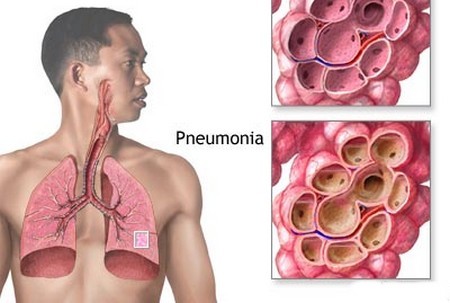Bacteria and viruses are the most frequent causes of pneumonia. An infectious disease by itself, pneumonia is also an all-too-common complication of other serious illnesses. When your defenses are low, you have a harder time combatting pneumonia germs when they invade. In fact, they can strike just when you seem to be getting better, and the blow can be lethal. In the United States, pneumonia is the sixth leading cause of death.
Pneumonia is difficult to diagnose in some situations. If you are elderly, you may not have the fever, coughing, and shortness of breath that go along with pneumonia in younger people. Visiting a doctor who routinely cares for older patients should ensure that he’ll look at all the possibilities and diagnose your illness correctly.

Although it may seem unlikely, an unusual form of pneumonia can be caused by accidentally inhaling oil.
One woman contracted this type of pneumonia from applying petroleum jelly to the inside of her nose for several years to combat dryness. Other people have gotten this type of pneumonia from excessive use of lip balm or hand lotion.
If your doctor diagnoses your illness as pneumonia, he will prescribe either an antibiotic or antiviral medication to fend off the infection. You need your doctor’s care for this illness, even though he may treat you at home instead of the hospital. Take his advice seriously and follow his instructions. You should be up and feeling better within a few days to a few weeks.
Here are some things you can do at home to speed your road to recovery.
- Stay in bed. Don’t get up and about until your fever is gone and you no longer feel short of breath.
- Use heat to treat your chest pain. You may feel better with a warm heating pad or a hot compress (a small towel dipped in hot water and wrung out) against your chest.
- Let the fluids flow. Aim for drinking a glass of water or other liquid every hour. This helps to thin out the secretions from your lungs so you can cough them up more easily. Fruit juice is a good choice to nourish your body and keep up your strength.
- Cool it. Use a cool-air humidifier in the room where you’re resting. Make sure it’s cleaned every day so airborne bacteria that collect in the humidifier won’t reinfect you.
- Toss your tissues. Have plenty of disposable tissues on hand to catch your sneezes and coughs, and dispose of them carefully so you don’t spread the infection to someone else.
- Keep on coughing. If you’re coughing up sputum, don’t take a cough suppressant. You’re helping rid your lungs of harmful secretions. If you have a dry, painful, non-productive cough, ask your doctor about taking a cough suppressant.
- Get some relief. You may want to take something for your pain and fever, such as acetaminophen, or a decongestant for your head and chest.